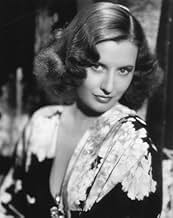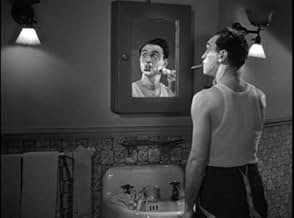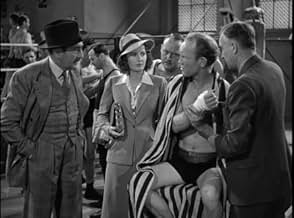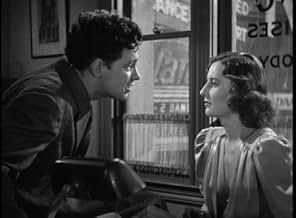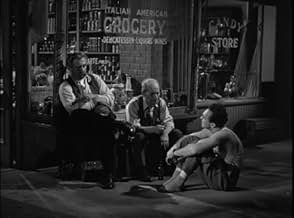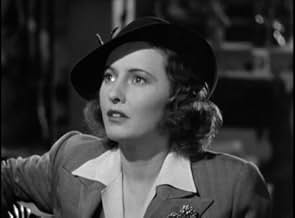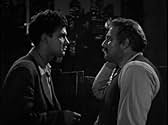IMDb RATING
6.8/10
2.3K
YOUR RATING
A poor young Italian man, who is a virtuoso on the violin, wishes to become a champion boxer to make a fortune for his family. But what is the road to success and happiness, and what is the ... Read allA poor young Italian man, who is a virtuoso on the violin, wishes to become a champion boxer to make a fortune for his family. But what is the road to success and happiness, and what is the price?A poor young Italian man, who is a virtuoso on the violin, wishes to become a champion boxer to make a fortune for his family. But what is the road to success and happiness, and what is the price?
- Nominated for 1 Oscar
- 1 win & 1 nomination total
Edward Brophy
- Roxy Lewis
- (as Edward S. Brophy)
Charles Halton
- Newspaperman
- (scenes deleted)
Stanley Andrews
- Driscoll - Fight Official
- (uncredited)
Gordon Armitage
- Fighter
- (uncredited)
Earl Askam
- Policeman
- (uncredited)
Don Brodie
- Reporter
- (uncredited)
Mushy Callahan
- Fight fan
- (uncredited)
Dora Clement
- Ill Ringsider Who Won't Leave
- (uncredited)
Featured reviews
Notable for being William Holden's debut (he was just 21 and looks almost like a schoolboy!), this dated melodrama was adapted from a popular play by Clifford Odets dealing with a young man conflicted about which path to take in his life: a respected artistic career playing the violin and the more alluring celebrity (which also reaps instant monetary rewards) as a prizefighter. His Italian immigrant father (Lee J. Cobb, whose mannered performance has been especially criticized) obviously wants the boy to follow his musical instincts, but the pull of the ring is too great more so because through it he meets and falls for Barbara Stanwyck, actually his manager (Adolphe Menjou)'s fiancée. Though initially acting under the latter's instructions, she eventually tries to dissuade him from fighting, particularly when gangster Joseph Calleia (another fine showcase for the Maltese character actor) takes Holden under his wing. The climax sees the hero winning the championship bout but at the cost of his black opponent's life and his own left hand; with the help of Stanwyck (realizing she really loves the boxer, Menjou relinquishes her) the "Golden Boy" stands up to his new boss interestingly, Calleia lets him off rather too easily here when compared to similar films of later vintage! The film is pretty good (with equally solid support from Sam Levene as Holden's struggling cab driver brother-in-law) though betraying its stage origins by relegating the boxing matches to only a brief montage until the not very imaginatively handled finale; in hindsight, it's curious to find this cinematically lacking given the involvement of Mamoulian and his reputation as one of the most creative directors of the early Talkie era!
"They are good for only one thing now - slugging!", Joe Bonaparte says with self-disgust, looking down at his broken hands after a middleweight prize fight at Madison Sqare Garden.
Joe had the option to be a great classical violinist, but the girl he was in love with wet his appetite for the quick buck and the American dream. "It's a big city, little people don't stand a chance", says Lorna, egging him up, playing up to his male ego. "Money's the answer". And the poor Italian immigrant kid grabs the bait, hangs up the violin and sells out.
'Golden Boy' is a piece of vintage Americana that is a bit hard to take today. Clifford Odets' controversial play was openly socialist and crammed with sudden, badly integrated political insights about "competetive civilization" and "a man hits his wife, and it's the first step towards fascism". It is all about the flip side of the American dream and gets a bit heavy-handed at times.
Lee J. Cobb is almost unbearably schmaltzy as the all-embracing, tearful Italian Papa, whereas Adolphe Menjou balances his performance carefully as the basically benign boxing promoter whose mistress is Lorna, Joe's chosen one, "just a dame from Newark" as she presents herself.
Barbara Stanwyck is more or less going through the motions as the hard-as-nails Lorna, and the real star of the picture is 21 year old newcomer William Holden, impossibly handsome and hunky, starting out with perfectly tousled curly hair. His performance is as yet immature and unfinished, but he has his moments and makes up for a shaky ride with loads of charisma, and he more than holds his own in the climactic title fight at the Garden, playing against the Chocolate Drop, "the pride of Harlem" in this race-segregated boxing haven.
'Golden Boy' is not, though, one of director Mamoulian's happier efforts. It is far too maudlin to look like anything Mamoulian ever did, it is not like him to lay it on this thick. It has none of the quirks or edge from 'Dr. Jekyll and Mr. Hyde' among others, but it is lushly, richly orchestrated in the vein of 19th century European music.
Joe had the option to be a great classical violinist, but the girl he was in love with wet his appetite for the quick buck and the American dream. "It's a big city, little people don't stand a chance", says Lorna, egging him up, playing up to his male ego. "Money's the answer". And the poor Italian immigrant kid grabs the bait, hangs up the violin and sells out.
'Golden Boy' is a piece of vintage Americana that is a bit hard to take today. Clifford Odets' controversial play was openly socialist and crammed with sudden, badly integrated political insights about "competetive civilization" and "a man hits his wife, and it's the first step towards fascism". It is all about the flip side of the American dream and gets a bit heavy-handed at times.
Lee J. Cobb is almost unbearably schmaltzy as the all-embracing, tearful Italian Papa, whereas Adolphe Menjou balances his performance carefully as the basically benign boxing promoter whose mistress is Lorna, Joe's chosen one, "just a dame from Newark" as she presents herself.
Barbara Stanwyck is more or less going through the motions as the hard-as-nails Lorna, and the real star of the picture is 21 year old newcomer William Holden, impossibly handsome and hunky, starting out with perfectly tousled curly hair. His performance is as yet immature and unfinished, but he has his moments and makes up for a shaky ride with loads of charisma, and he more than holds his own in the climactic title fight at the Garden, playing against the Chocolate Drop, "the pride of Harlem" in this race-segregated boxing haven.
'Golden Boy' is not, though, one of director Mamoulian's happier efforts. It is far too maudlin to look like anything Mamoulian ever did, it is not like him to lay it on this thick. It has none of the quirks or edge from 'Dr. Jekyll and Mr. Hyde' among others, but it is lushly, richly orchestrated in the vein of 19th century European music.
William Holden became a star as a result of this film, but there is no question that Barbara Stanwyck is the real star of this picture. She gives a performance that is beautifully layered and Her performance is nothing short of marvelous (My favorite line is when she says, "I'm my mother's girl"). And those beautiful shoulders!
Everyone knows the story of the boy who is torn between a life of boxing and music. The screenplay is a product of the times that it was written in. How else can you explain dialogue that glorifies men beating their wives? Or the leftist remarks that are spoken by the Bonaparte's friend, Mr. Carp? A black boxer named "Chocolate"?! Never happen today.
Everyone is great. Lee J. Cobb as an Italian is heartbreaking, even if his accent is laid on a little thick (It's like watching Laurence Olivier in "The Jazz Singer"). Sam Levene is good as the brother-in-law. And Joseph Calleia as Fuseli, is wonderful. When Stanwyck enters Holden's dressing room after the fight, he says, "Out Miss Moon, this ain't no cocktail lounge." Wonderful. I would love to see Pacino ham his way through this role.
But it is Miss Stanwyck who stands out. We can be thankful that she gave Holden his opportunity and fought to keep him. We can be even more grateful for this wonderful performance.
Everyone knows the story of the boy who is torn between a life of boxing and music. The screenplay is a product of the times that it was written in. How else can you explain dialogue that glorifies men beating their wives? Or the leftist remarks that are spoken by the Bonaparte's friend, Mr. Carp? A black boxer named "Chocolate"?! Never happen today.
Everyone is great. Lee J. Cobb as an Italian is heartbreaking, even if his accent is laid on a little thick (It's like watching Laurence Olivier in "The Jazz Singer"). Sam Levene is good as the brother-in-law. And Joseph Calleia as Fuseli, is wonderful. When Stanwyck enters Holden's dressing room after the fight, he says, "Out Miss Moon, this ain't no cocktail lounge." Wonderful. I would love to see Pacino ham his way through this role.
But it is Miss Stanwyck who stands out. We can be thankful that she gave Holden his opportunity and fought to keep him. We can be even more grateful for this wonderful performance.
Clifford Odets' play about a musician turned boxer was a natural for Hollywood, which has always loved boxing movies. Perhaps subliminally, Odets was inspired by the Fannie Hurst "Humoresque," first made into a film in 1920.
When "Golden Boy" was done in 1938 as a production of the Group Theater, John Garfield hoped to play the role of Joe Bonaparte and was disappointed when the lead went instead to Luther Adler, with Garfield relegated to the role of Siggie.
Garfield rectified this in 1952 when he played the lead on Broadway and also had his chance to play a boxer in "Body and Soul" and a violinist in "Humoresque." Tony Curtis is another who did the part of Joe as a young actor before going to Hollywood.
There are two ways of casting this role - the Garfield way - the streetwise fighter who happens to be a gifted violinist, or the reverse - the gentle violinist who just happens to be a gifted fighter. The latter is more interesting, as the audience is then able to see how the fight world changes an artistic soul.
Columbia took this route and chose 27-year-old Richard Carlson for the role, but he was appearing on Broadway at the time. After testing nearly everyone, the studio put 21-year-old William Holden in the role. His was a new face and a pretty one - he certainly didn't look like a fighter.
A part like this for someone who had two uncredited film appearances had to have been like winning Scarlett O'Hara and just as daunting; were it not been for the help and intervention of Barbara Stanwyck, who played Lorna (originally done on stage by Frances Farmer) Holden would have been fired.
The theme of following your heart, so often explored by Eugene O'Neill, is another overriding theme in this story, with the character of Joe Bonaparte torn between his love for playing the violin and the appeal of making money as a fighter and being somebody.
Joe comes from an immigrant family who all live together - seen so often in films from the '30s and '40s -- again, "Humoresque" comes to mind. This immediately dates the film and puts it right into its period.
The other thing that dates it is the over the top performance of Lee J. Cobb as Joe's dad. Cobb was in the original play on Broadway but as another character; he would repeat his role as the father in the Garfield production. Undoubtedly this characterization worked better on stage and definitely worked better for a '30s audience.
William Holden gives a tender performance as Joe, an artist at heart who falls for his manager's girlfriend. Like Glenn Ford, he had one of those faces that changed so totally that he isn't even recognizable as William Holden in this film - even his voice is different.
He's young, beautiful, with an unlined face and a higher voice. His performance opened up light leading man roles for him. It wasn't until 1950 that he had his second breakthrough film, "Sunset Boulevard" - which vaulted him into superstardom. That William Holden was virile, rugged, and handsome. It's an amazing transformation.
Stanwyck is perfect as Lorna Moon - tough, sexy, and a marshmallow underneath. Her chemistry with Holden is excellent. He never forgot how much she helped him, and sent her roses each time she started a new film.
"Golden Boy" was turned into a Broadway musical as well - there's something enduring about the story of a man's struggle to find his true destiny. This is as good an example of that struggle as you'll find anywhere.
When "Golden Boy" was done in 1938 as a production of the Group Theater, John Garfield hoped to play the role of Joe Bonaparte and was disappointed when the lead went instead to Luther Adler, with Garfield relegated to the role of Siggie.
Garfield rectified this in 1952 when he played the lead on Broadway and also had his chance to play a boxer in "Body and Soul" and a violinist in "Humoresque." Tony Curtis is another who did the part of Joe as a young actor before going to Hollywood.
There are two ways of casting this role - the Garfield way - the streetwise fighter who happens to be a gifted violinist, or the reverse - the gentle violinist who just happens to be a gifted fighter. The latter is more interesting, as the audience is then able to see how the fight world changes an artistic soul.
Columbia took this route and chose 27-year-old Richard Carlson for the role, but he was appearing on Broadway at the time. After testing nearly everyone, the studio put 21-year-old William Holden in the role. His was a new face and a pretty one - he certainly didn't look like a fighter.
A part like this for someone who had two uncredited film appearances had to have been like winning Scarlett O'Hara and just as daunting; were it not been for the help and intervention of Barbara Stanwyck, who played Lorna (originally done on stage by Frances Farmer) Holden would have been fired.
The theme of following your heart, so often explored by Eugene O'Neill, is another overriding theme in this story, with the character of Joe Bonaparte torn between his love for playing the violin and the appeal of making money as a fighter and being somebody.
Joe comes from an immigrant family who all live together - seen so often in films from the '30s and '40s -- again, "Humoresque" comes to mind. This immediately dates the film and puts it right into its period.
The other thing that dates it is the over the top performance of Lee J. Cobb as Joe's dad. Cobb was in the original play on Broadway but as another character; he would repeat his role as the father in the Garfield production. Undoubtedly this characterization worked better on stage and definitely worked better for a '30s audience.
William Holden gives a tender performance as Joe, an artist at heart who falls for his manager's girlfriend. Like Glenn Ford, he had one of those faces that changed so totally that he isn't even recognizable as William Holden in this film - even his voice is different.
He's young, beautiful, with an unlined face and a higher voice. His performance opened up light leading man roles for him. It wasn't until 1950 that he had his second breakthrough film, "Sunset Boulevard" - which vaulted him into superstardom. That William Holden was virile, rugged, and handsome. It's an amazing transformation.
Stanwyck is perfect as Lorna Moon - tough, sexy, and a marshmallow underneath. Her chemistry with Holden is excellent. He never forgot how much she helped him, and sent her roses each time she started a new film.
"Golden Boy" was turned into a Broadway musical as well - there's something enduring about the story of a man's struggle to find his true destiny. This is as good an example of that struggle as you'll find anywhere.
Well-written and well-acted vehicle serves as William Holden's entree to stardom. He was just 21 and is easier to recognize in his opening scene by his voice rather than his boyish looks and longish hair. Regardless of what it took to get him to give this performance, it is one that will be long remembered. Barbara Stanwyck plays the tough cookie who discovers she has a heart of gold, reminiscent of her role later perfected in "Meet John Doe." When asked if she was Adolphe Menjou's girl, Barbara replies "I'm my mother's girl." Great cast of supporting character actors add to enjoyment of a solid production whose best scenes involve family and not the ring. Good camera work, especially of those fight scenes, excellent sets, and great direction make this a surprisingly good night's entertainment. I avoided it for years thinking this was just another fight movie -- it is not -- and am now sorry that I waited.
Did you know
- TriviaWilliam Holden was so grateful to Barbara Stanwyck for her insistence on casting him in L'Esclave aux mains d'or (1939), his first big role, that he reportedly sent her flowers every year on the anniversary of the first day of filming.
- GoofsJoe's chest is completely smooth during the big fight. Immediately after the fight, when he is dressed, he has chest hair visible at the top of his shirt.
- Quotes
Eddie Fuseli: This your girl?
Lorna Moon: I'm my mother's girl.
- Alternate versionsA video version in Argentina was lifted from a 16mm print from Columbia Pictures, in English with Spanish language subtitles. The credits of this version are translated in Spanish.
- ConnectionsEdited into Head (1968)
- SoundtracksWe're in the Money Now
Sung a cappella by Adolphe Menjou to the tune of the traditional
nursery rhyme "The Farmer in the Dell"
- How long is Golden Boy?Powered by Alexa
Details
- Release date
- Country of origin
- Language
- Also known as
- Golden Boy
- Filming locations
- Eighth Avenue and 50th Street, Manhattan, New York City, New York, USA(Madison Square Garden, located at the West side of 8th Avenue from 1925 to 1968)
- Production company
- See more company credits at IMDbPro
- Runtime
- 1h 39m(99 min)
- Color
- Aspect ratio
- 1.37 : 1
Contribute to this page
Suggest an edit or add missing content

